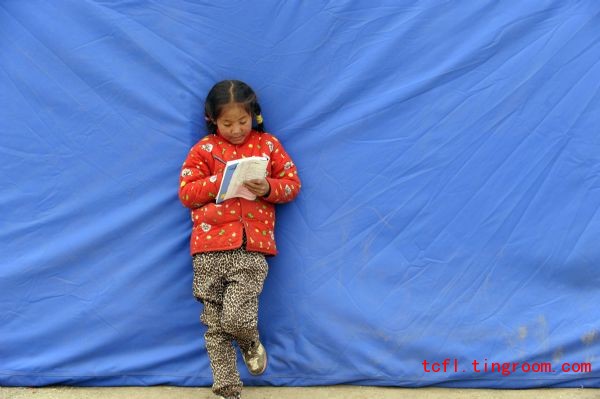联合国儿童基金会向受灾儿童紧急运送教学物资

联合国儿童基金会于4月21日宣布已向灾区发送150顶学校帐篷以协助教育部门在四月底之前争取实现全面复课。
震中位于中国西北部青海省玉树县结古镇的7.1级地震对当地学校造成了较大影响。据玉树县教育部门估计,该县80%的小学和50%的中学校舍在此次强震中严重受损。
联合国儿童基金会于4月20日向灾区发送了150顶学校帐篷。玉树县属于国家级贫困县。
结古镇近半数的学生来自于周边的偏远乡村,在县城的寄宿学校中上学。玉树县目前有23197名学生和938名教师。在灾难过后,尽早让孩子们返回课堂是帮助他们从社会心理压力中恢复的重要措施。由联合国儿童基金会提供的150顶72平米学校帐篷可以容纳7500名学生,帮助他们继续学业。此外,联合国儿童基金会还将为寄宿制和非寄宿制学校提供学生用具、黑板、发电机、防寒服、棉靴、毛毯和教学用具等。
“我们很高兴地看到,这场灾难过后不久中国政府就采取了积极有力的措施,帮助学生复课。” 联合国儿童基金会驻华代表兼联合国在华灾情管理工作组主席魏英瑛博士(Dr. Yin Yin Nwe)说。“我们正在与教育部门合作,向学生们提供复课所需的物资。”
截至4月22日17:00点,地震已造成2187人死亡,80人失踪,12135人受伤。由于缺乏足够的食品、衣物和安置物资,再加上灾区位于高海拔地区,夜晚气温在零度以下,陆路较难到达,都给救灾工作造成了一定的困难。此外,近日灾区又出现了降雪和大风天气,主要的公路交通运输线面临较大压力,一定程度上也影响了工作进展。
随着搜救工作接近尾声,联合国儿童基金会将继续向相关部门了解灾区儿童的需求并协调开展援助行动。
灾区的食品供应成为主要问题。联合国机构正通力合作,协调援助行动。联合国儿童基金会将为灾区儿童提供维他命和矿物质补充剂,而联合国世界粮食计划署将提供食品,以增加儿童的营养供给。
目前,民政部门仍在统计在地震中失去一方或双方父母的儿童人数。鉴于地震造成了较大人员伤亡,并对民房、学校和社区造成大面积损坏,儿童和其他脆弱群体所面临的心理压力已经引起了各方的较大关注。
联合国儿童基金会将协助国务院妇女儿童工作委员会设立“儿童友好家园”,为灾区儿童提供全面的社会心理支持服务。联合国儿童基金会发现,在灾难过后,90%到95%的妇女儿童在接受以社区为基础的服务后可以走出灾难造成的心理阴影,但仍有5%至10%的人需要更为专业化的干预措施。如果不能及时有效的满足儿童和社区的心理和社会需求,可能会长期影响他们的心理康复能力。
联合国儿童基金会在1947年至1951年间即解放前后曾向中国提供援助,援助内容包括:紧急救援、食品营养以及提供卫生保健培训等。1979年,联合国儿童基金会正式开始与中国政府合作,为儿童提供卫生保健和营养、良好的供水和环境卫生设施,保障所有男孩和女孩都能接受优质的基础教育,并保护儿童免受暴力、剥削和艾滋病的伤害。联合国儿童基金会在全世界超过150个国家和地区开展工作,帮助儿童在婴幼儿期和青少年时期实现生存和发展的权利。
UNICEF rushing school supplies to quake-affected children
The United Nations Children's Fund (UNICEF) said at a press release on April 21 that it had dispatched 150 school tents to the earthquake zone in a bid to support education authorities' goal of re-establishing regular classes by the end of April.
The 7.1 magnitude earthquake which struck near the town of Jiegu in northwest China, took a heavy toll on schools. Local education authorities estimate 80 percent of primary schools and 50 percent of secondary schools in the county were severely damaged.
UNICEF Tuesday dispatched 150 school tents to the earthquake zone. Yushu is one of the poorest counties in China.
Fully 50 percent of students in Jiegu Township are boarding students, sent from surrounding areas to the county seat for their studies. Yushu County has a total of 23,197 students and 938 teachers. The early return of children to school following disaster is an important step in helping them overcome psychosocial stress. The UNICEF 72 square meter classroom tents will provide space for 7,500 students to resume their studies. UNICEF is also sending student supply kits, blackboards and generators, as well as warm clothing, boots, wool blankets and school supplies for children in both day and boarding schools.
"We are very happy that strong Government efforts are being made to assist children to recommence classes following this disaster," said Dr. Yin Yin Nwe, UNICEF Representative in China and Chair of the UN Disaster Management Team. "We are working with education authorities to provide all the basic needs required for children to continue to learn."
As of 5 p.m. Thursday, the number of earthquake casualties stood at 2,187 dead, 80 missing and 12,135 injured. The lack of food, clothing and shelter combined with the high altitude, freezing temperatures and difficult road access continue to complicate relief efforts. Recent snowfall, high winds and the heavy traffic of relief convoys are also hindering efforts.
As search and rescue efforts wind down UNICEF continues to coordinate its assistance with local and national authorities best placed to assess the needs of children.
Food supply is also a serious problem in the earthquake zone and UN agencies are working together to coordinate assistance. Vitamin and mineral supplement packets from UNICEF will be provided along with staple foods for young children from World Food Programme in order to increase nutrient intake.
Currently, civil affairs authorities are still trying to determine the number of children who have lost one or both parents to the earthquake. Given the loss of lives caused by the earthquake and the extensive damage caused to homes, schools and communities, psychological distress to children and other vulnerable groups has been identified as a grave concern.
UNICEF will help the National Working Committee on Children and Women to establish "Child Friendly Spaces" to provide a range of psycho-social support services for affected children. UNICEF has found that 90–95 percent of children and women are able to recover following disasters from community based services alone; but 5–10 percent require more expert treatment to recover. Failure to promptly and appropriately address the psychological and social needs of children and communities can have long-term consequences on their capacity to recover.
UNICEF first assisted China between 1947 and 1951, providing emergency services, food and nutrition, health and hygiene training during and after the war of liberation. In 1979 UNICEF officially commenced its cooperation with the Government of China to support child health and nutrition, good water and sanitation, quality basic education for all boys and girls, and the protection of children from violence, exploitation, and AIDS. UNICEF is on the ground in over 150 countries and territories to help children survive and thrive, from early childhood through adolescence.
(China.org.cn April 27, 2010)
 English
English Japanese
Japanese Korean
Korean French
French German
German Spanish
Spanish Italian
Italian Arab
Arab Portuguese
Portuguese Vietnamese
Vietnamese Russian
Russian Finnish
Finnish Thai
Thai dk
dk